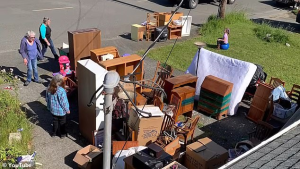Meet Flash Shelton, a handyman from Northern California who found himself in a frustrating situation when squatters took over his mother’s vacant home. Fueled by anger and determination, Flash hatched a plan to reclaim the property – by squattering on the squatters!

In a bold and unconventional move, Flash armed himself with firearms and documented the entire experience in a viral video that he shared on social media. As the squatters left the house to run errands, Flash seized the opportunity to break into the property and make it his own. “If they could take a house, then I could take a house,” he declared in the video.

As a paying member of the United Handyman Association, Flash was deeply offended by the audacity of the squatters. They had not only invaded his mother’s home but also ignored the responsibility of finding their own place to live. Determined to teach them a lesson, Flash took matters into his own hands.

With his video already amassing over three million views in just two months, it’s clear that Flash struck a chord with many people facing similar situations. In the video’s description, he explained his rationale for his drastic actions. “I had heard horror stories about how the legal system gives the squatter more rights than the homeowner,” he wrote. “So, I decided to come up with a way on my own to get them out in less than a day.”

Flash emphasized that his approach may not work for everyone and advised caution. He acknowledged that his special training and license to carry gave him an advantage in handling any potential conflicts with the squatters. He also highlighted the importance of expecting the worst and being prepared when dealing with such situations.
While Flash’s method may be controversial, it raises an interesting question: What do you think about his approach to squatting on the squatters? Should individuals take matters into their own hands when dealing with such situations? Whether you agree or disagree, Flash Shelton’s story is a reminder that sometimes, unconventional actions may be necessary when faced with challenges that the legal system fails to address effectively.

